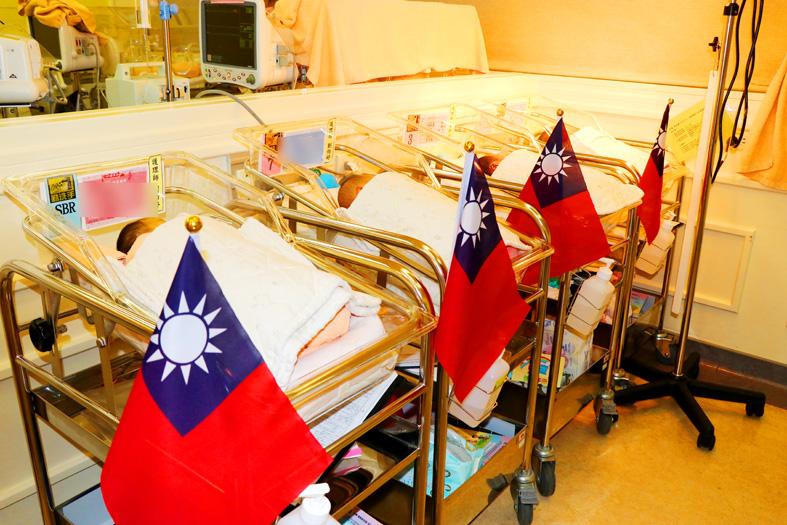The Ministry of the Interior recorded 9,601 births in January, the first time the nation has produced fewer than 10,000 newborns in a single month, while different indicators showed that Taiwan might also be facing a population with increasingly fewer births, women and marriages.
It comes after the ministry reported a record low 165,249 births last year, which was lower than the 173,156 deaths recorded last year.
The nation experienced negative population growth for the first time last year, ministry data found.

Photo: Copied by Tsai Shu-yuan, Taipei Times
The number of births in January also dropped from a year earlier, when there were 12,510 births.
In February, there were 11,497 newborns, ministry data showed.
Statistics continue to show an imbalance in the gender ratio among newborns, with more boys than girls being born.
The ratio was 110.08 males for every 100 females in 2003 and 110.57:100 in 2004, ministry data showed.
Although that number has gradually fallen since then, it has continued to fluctuate, the data showed.
The ratio was 109.46:100 in 2010 and 108.27:100 in 2015 and has remained at about 107:100 over the past five years, with last year’s figure being 107.74:100.
The marriage rate has continued to decline, with the number of marriages registered falling to an 11-year low of 121,702 last year.
Alice Cheng (鄭雁馨), an associate research fellow at Academia Sinica’s Institute of Sociology, yesterday said that in Taiwan, the ratio of male births to female births remains high — greater than in Japan and South Korea — and the nation’s female population is shrinking.
The “natural” sex ratio at birth should be about 104 to 106 males born for every 100 females, she said, adding that any number that is higher than that is considered a gender imbalance.
People’s preference for boys over girls resulting in sex selection or the killing of female embryos might be the cause of overly high male to female ratios at birth, she said.
Among Asian countries, the male-to-female ratio at birth began to climb in the mid-1980s, she said, adding that it reached almost 120:100 in China when the disparity was at its highest.
Cheng said that Japan’s ratio might be relatively balanced due to a realization following the Meiji Restoration that girls are a foundation of the nation’s power and should receive an education.
In South Korea, with government intervention, the ratio has returned to “normal” levels in the past few years, she added.
Commenting on the number of births in January, Cheng said that the COVID-19 pandemic might have led to delays in wedding ceremonies, resulting in fewer married couples and newborns.
Whether the pandemic was the main cause of the decline in births in January could be judged by whether the number of births subsequently rises or falls, Cheng said.

A decision to describe a Chinese Ministry of Foreign Affairs statement on Singapore’s Taiwan policy as “erroneous” was made because the city-state has its own “one China policy” and has not followed Beijing’s “one China principle,” Deputy Minister of Foreign Affairs Tien Chung-kwang (田中光) said yesterday. It has been a longstanding practice for the People’s Republic of China (PRC) to speak on other countries’ behalf concerning Taiwan, Tien said. The latest example was a statement issued by the PRC after a meeting between Singaporean Prime Minister Lawrence Wong (黃循財) and Chinese President Xi Jinping (習近平) on the sidelines of the APEC summit

Taiwan’s passport ranked 34th in the world, with access to 141 visa-free destinations, according to the latest update to the Henley Passport Index released today. The index put together by Henley & Partners ranks 199 passports globally based on the number of destinations holders can access without a visa out of 227, and is updated monthly. The 141 visa-free destinations for Taiwanese passport holders are a slight decrease from last year, when holders had access to 145 destinations. Botswana and Columbia are among the countries that have recently ended visa-free status for Taiwanese after “bowing to pressure from the Chinese government,” the Ministry

HEALTHCARE: Following a 2022 Constitutional Court ruling, Taiwanese traveling overseas for six months would no longer be able to suspend their insurance Measures allowing people to suspend National Health Insurance (NHI) services if they plan to leave the country for six months would be abolished starting Dec. 23, NHIA Director-General Shih Chung-liang (石崇良) said yesterday. The decision followed the Constitutional Court’s ruling in 2022 that the regulation was unconstitutional and that it would invalidate the regulation automatically unless the NHIA amended it to conform with the Constitution. The agency would amend the regulations to remove the articles and sections that allow the suspension of NHI services, and also introduce provisional clauses for those who suspended their NHI services before Dec. 23, Shih said. According to

Minister of Labor Ho Pei-shan (何佩珊) yesterday apologized after the suicide of a civil servant earlier this month and announced that a supervisor accused of workplace bullying would be demoted. On Nov. 4, a 39-year-old information analyst at the Workforce Development Agency’s (WDA) northern branch, which covers greater Taipei and Keelung, as well as Yilan, Lienchiang and Kinmen counties, was found dead in their office. WDA northern branch director Hsieh Yi-jung (謝宜容), who has been accused of involvement in workplace bullying, would be demoted to a nonsupervisory position, Ho told a news conference in Taipei. WDA Director-General Tsai Meng-liang (蔡孟良) said he would